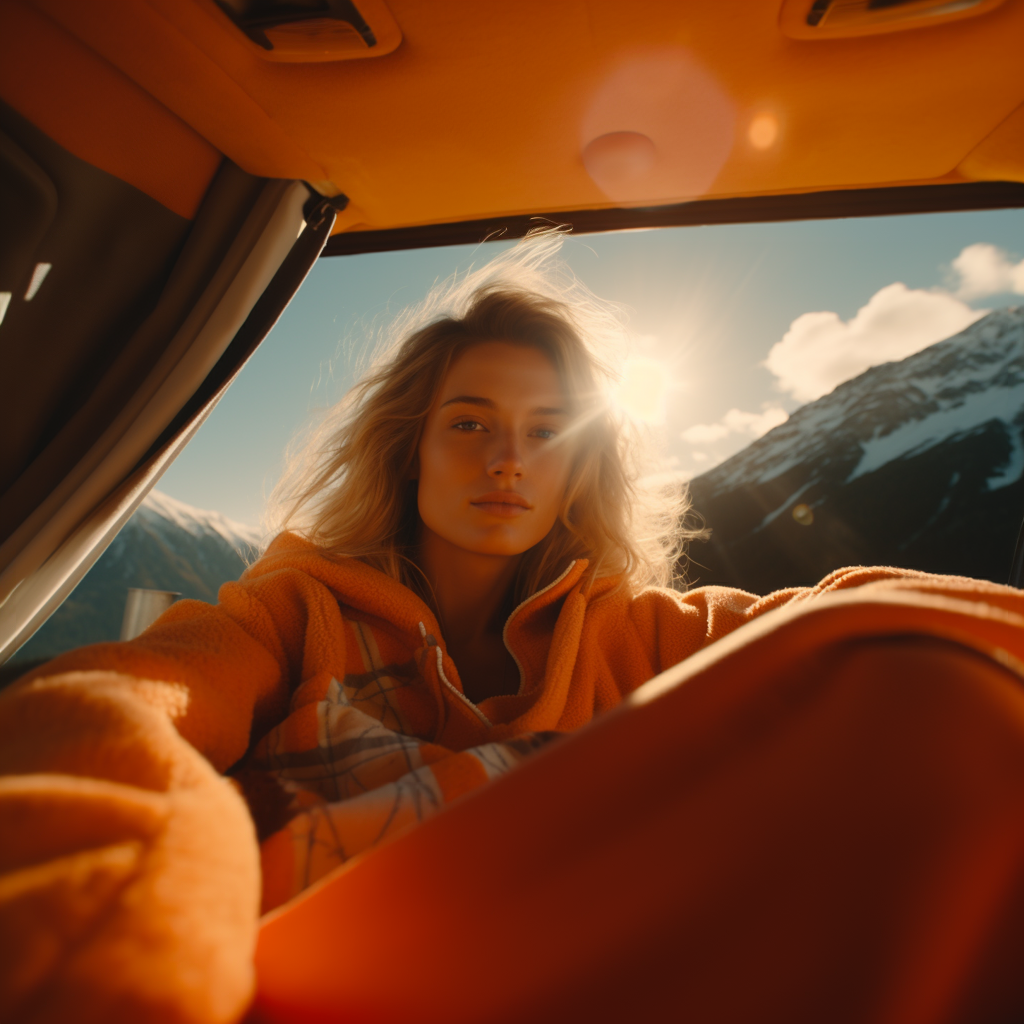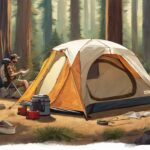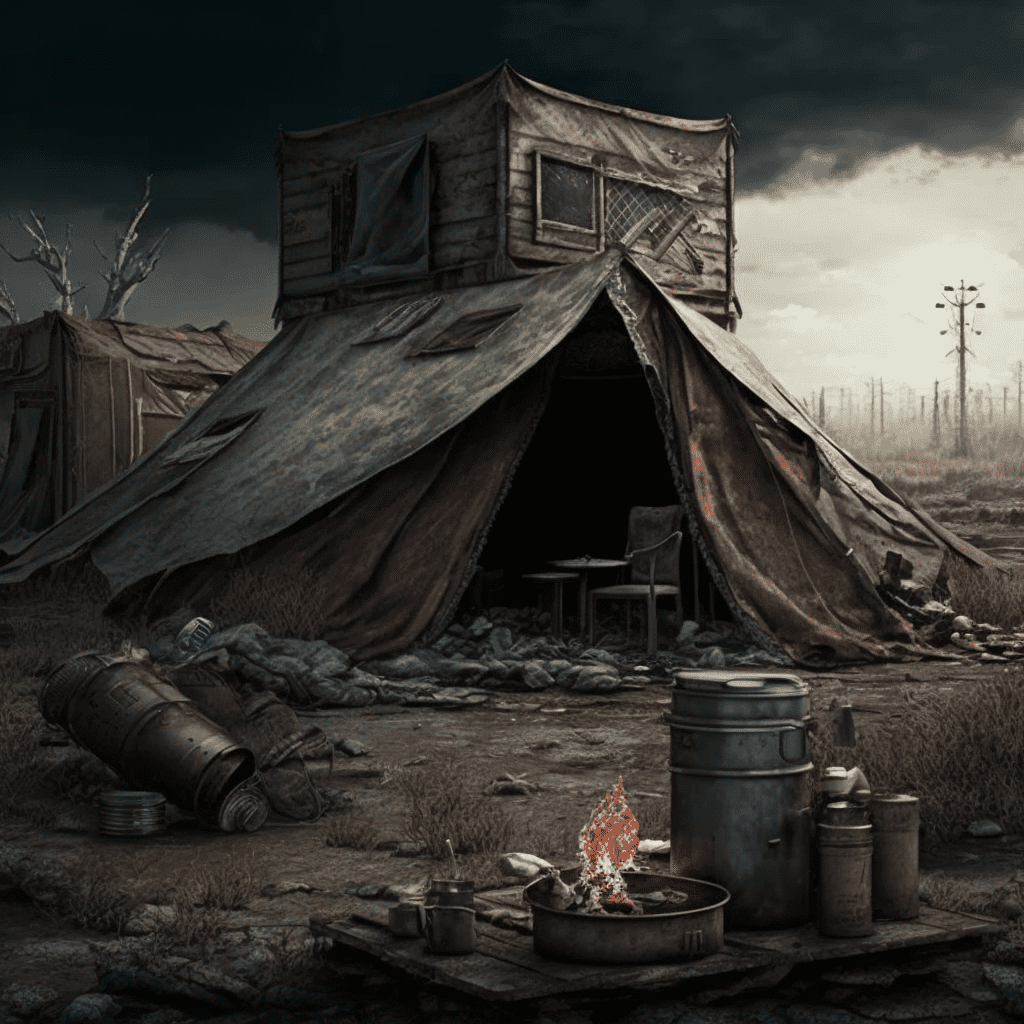Solo Camping
Essential Solo Camping Safety Guide
Gear up for a thrilling adventure in the wilderness with this essential solo camping safety guide – discover the key to surviving and thriving alone in nature.

When exploring the wild on your own, it’s crucial to be ready like a seasoned adventurer mapping unknown lands. Dive into the adventure and unveil the secrets of the great outdoors for an unforgettable experience.
The solitude of solo camping offers a unique connection to nature, but it also demands a heightened sense of caution and preparedness.
As the sun begins to set and the forest whispers around you, the knowledge of essential safety practices becomes more than just a guide; it becomes a lifeline.
So, what are some key elements to consider when embarking on a solo camping expedition? Stay tuned to uncover the crucial components that can make or break your solitary communion with the great outdoors.
Key Takeaways
- Carry a well-equipped first aid kit and inform someone of your camping location.
- Prioritize flat, safe campsite selection away from wild predators.
- Equip with emergency communication devices and avoid unnecessary risks.
- Research local wildlife, minimize food odors, and respect wildlife habitats for safety.
Basic Solo Camping Gear Checklist
When embarking on a solo camping adventure, ensuring you have the right gear is paramount for a safe and enjoyable experience. The first item on the essential gear checklist for a solo camping trip is a high-quality sleeping bag. A warm, well-insulated sleeping bag is crucial for a restful night's sleep, especially when camping alone.
Alongside the sleeping bag, a reliable headlamp is indispensable. Whether you're setting up camp after sunset or need to navigate in the dark, a headlamp provides hands-free illumination, enhancing both safety and convenience.
Another vital piece of equipment for solo camping is a water filtration system. Access to clean drinking water is essential for survival in the wilderness, making a portable water filtration system a must-have for solo campers.
Essential Wilderness Safety Guidelines
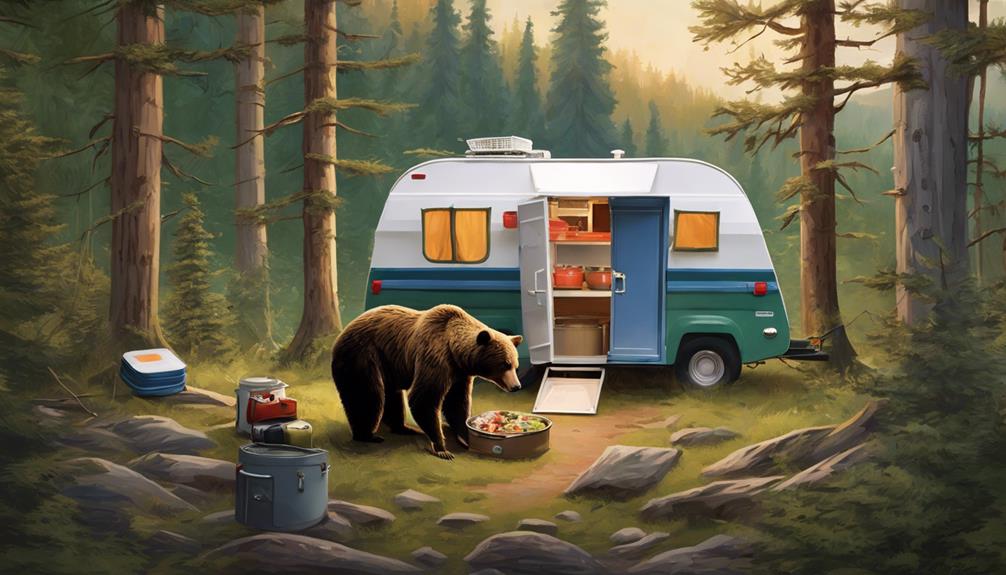
Exploring the wilderness demands a keen understanding of essential safety guidelines to navigate and thrive in the great outdoors. When venturing into the wild, it's crucial to carry a well-equipped first aid kit and have the knowledge to administer basic first aid in case of emergencies.
Familiarize yourself with local wildlife and potential hazards, taking necessary safety precautions to prevent wildlife encounters. Adhering to Leave No Trace principles ensures you minimize your impact on the environment, preserving the natural beauty for future adventurers. Always inform a trusted individual of your camping location and expected return time for added security.
Prioritize safety by staying aware of your surroundings, potential risks, and changing weather conditions. Additionally, be prepared for unforeseen situations like getting lost by having essential solo camping gear such as a camping stove and proper sleeping arrangements. By following these wilderness safety guidelines, you can enjoy the freedom of solo camping while staying safe and prepared.
Campsite Selection and Preparation Tips
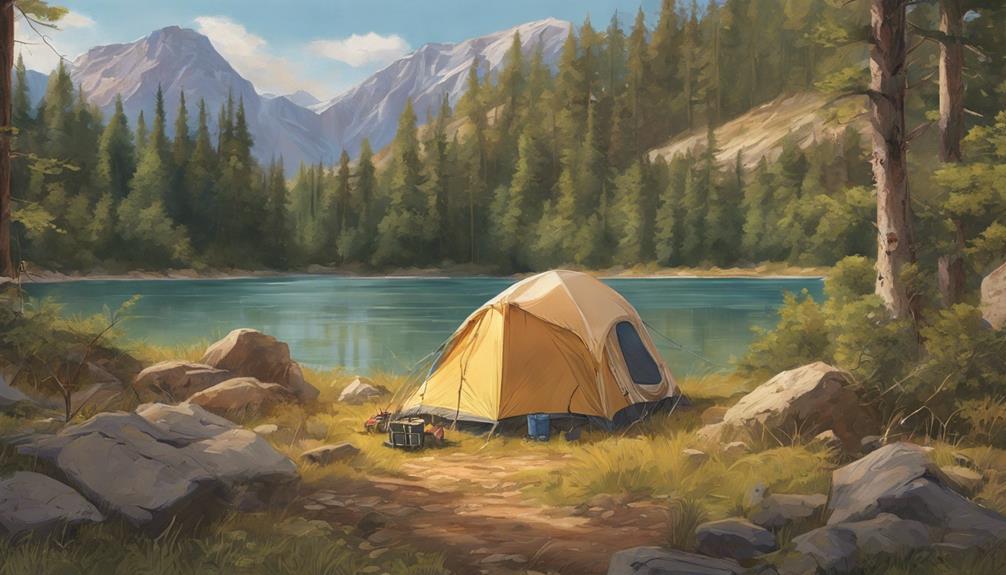
Before setting up camp in the wilderness, locating a suitable campsite plays a pivotal role in ensuring a safe and enjoyable solo camping experience. When choosing a campsite, prioritize flat terrain for easy tent setup and movement. Safety is paramount, so avoid areas with wild predators or poisonous plants.
Research online reviews to find spots with reliable reception for communication in case of emergencies. Look for campsites near trails or roads to facilitate exploration and access to help if needed. A comfortable campsite can make a big difference, so consider factors like shade and proximity to water sources.
Be cautious of potential hazards such as steep cliffs or volatile weather conditions. By preparing well and choosing wisely, solo campers can create a secure and pleasant environment for their outdoor adventures.
Emergency Preparedness Strategies
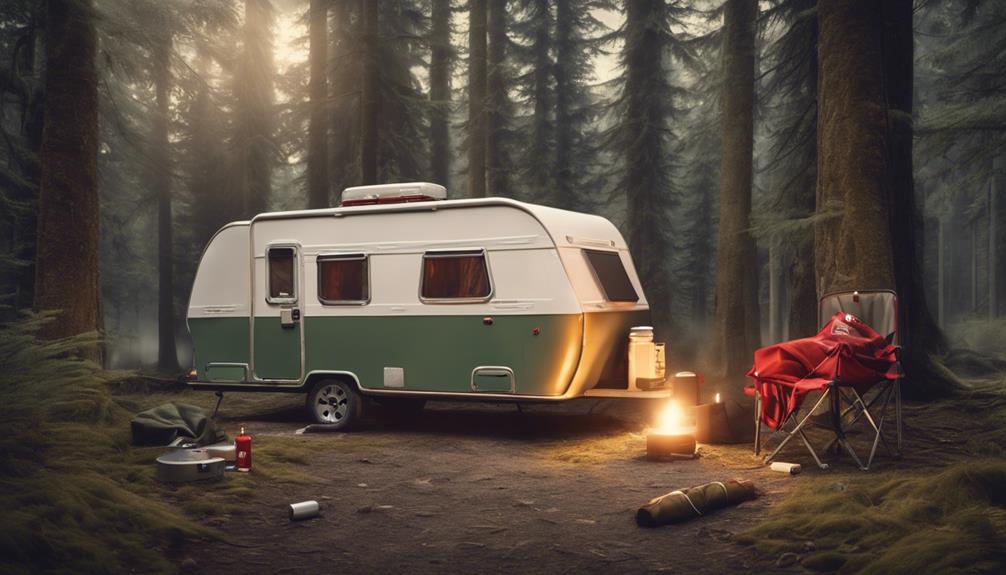
To enhance safety in solo camping expeditions, it's essential to equip oneself with emergency devices such as a satellite phone or locator beacon for effective communication during unforeseen circumstances. These GPS devices or personal locators can be lifesavers in emergencies, allowing solo campers to communicate distress signals and their exact location for swift rescue operations.
Additionally, informing a trusted person about the camping itinerary adds an extra layer of safety, ensuring that someone is aware of the plans and can take action if needed.
Prioritizing safety measures while solo camping is crucial to minimize risks and ensure a secure outdoor experience. Avoiding unnecessary risks during activities like hiking and exploring can help prevent accidents or injuries. Moving cautiously in the environment, being aware of surroundings, and being prepared for unforeseen events are all part of emergency preparedness strategies for solo campers.
Wildlife Interaction and Safety Measures
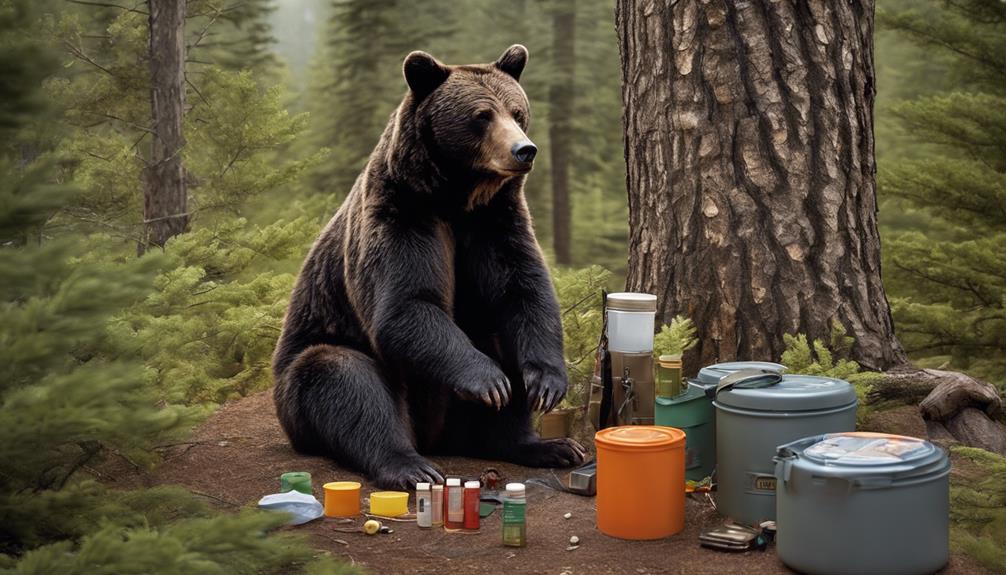
When venturing into the wilderness for a solo camping adventure, understanding wildlife behavior and implementing safety measures is paramount to a successful and secure outdoor experience. Researching native wildlife in the camping area is crucial to anticipate potential encounters with specific species. Minimizing food odors and properly storing food are essential to avoid attracting wildlife to the campsite. Using bear-proof containers or hanging food away from the campsite can prevent wildlife interactions and keep both campers and animals safe.
Taking wildlife precautions such as making noise while hiking can alert wildlife of your presence, reducing the chances of surprising them. It's important to respect wildlife and their habitats by observing them from a safe distance and refraining from feeding or approaching them. By following these wildlife safety measures and showing wildlife respect, campers can enjoy a harmonious coexistence with nature during their solo camping expedition.
Frequently Asked Questions
How Safe Is Solo Camping?
Solo camping is generally safe when campers take precautions and follow guidelines. Risks can be minimized by informing others of the itinerary and carrying emergency equipment. Confidence and empowerment often result from successful solo camping experiences.
What to Do While Solo Camping?
While solo camping, one can engage in nature activities like hiking, fishing, or birdwatching to fully immerse themselves outdoors. It's an opportunity to practice mindfulness, connect with nature, and capture memorable moments for lasting memories.
How to Camp Alone as a Woman?
When camping alone as a woman, trust instincts, choose populated sites, carry self-defense tools, keep campsite tidy, and connect with fellow solo campers. Safety first, remain cautious of strangers, and find adventure with peace of mind.
When You Go Camping What Are 3 Things You Need to Take With You?
When heading out camping, one must always bring a trusty first aid kit, navigation tools, and appropriate clothing. These essentials ensure safety and comfort, allowing adventurers to explore the great outdoors with peace of mind.
Conclusion
In conclusion, remember to pack your gear, follow safety guidelines, and stay prepared for any emergencies while solo camping.
With proper planning and precautions, you can enjoy the wilderness with peace of mind.
Stay safe, stay savvy, and savor the serenity of solo camping!
Solo Camping
Ultimate Guide to Solo Tetty Camping Adventures
Hone your solo Tetty camping skills with our comprehensive guide, ensuring an unforgettable adventure filled with nature's wonders and valuable tips.
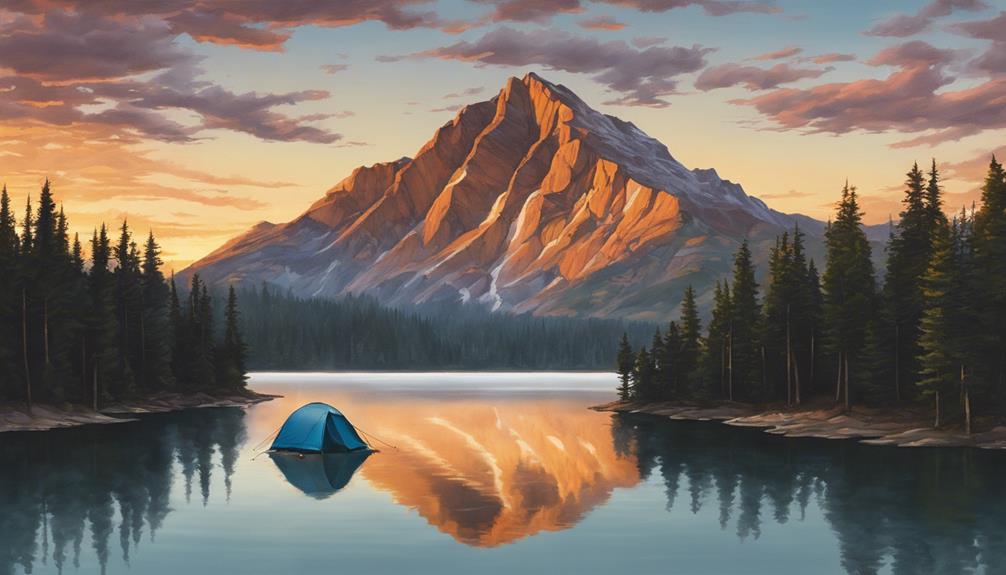
Embark on memorable solo camping trips with our all-inclusive guide, guaranteeing a secure and rewarding experience amidst nature’s beauty. Equip yourself with a durable tent, cozy sleeping bag, handy camping stove, efficient water filter, and dependable lighting. Make safety a top priority by informing others of your plans, packing necessary emergency items, and selecting safe camping locations. Select an ideal spot by analyzing potential risks, choosing level ground close to water sources, and maintaining a safe distance from wildlife.
When it comes to cooking solo, opt for lightweight stoves, versatile ingredients, portable spice kits, and specialized cookware. Embrace solitude with mindfulness practices, deep breaths, nature walks, gratitude, and meditation. Enhance your outdoor experience and discover more tips for solo Tetty camping adventures.
Key Takeaways
- Prioritize safety by sharing your itinerary and carrying emergency supplies.
- Choose secure campsites in well-traveled locations.
- Select flat ground near water sources, away from wildlife.
- Pack light with versatile cooking gear for solo meals.
- Embrace solitude with mindfulness practices in nature.
Essential Gear for Tetty Camping
When preparing for solo Tetty camping adventures, selecting the right gear is crucial to ensure a safe and enjoyable experience in the great outdoors. Solo camping presents unique challenges, making proper equipment selection essential.
A quality tent with durable fabric and waterproofing is a must-have for Tetty camping, providing shelter from the elements. Pair this with a lightweight sleeping bag specifically designed for Tetty camping conditions to ensure a restful night's sleep.
Safety concerns are paramount, so investing in a compact camping stove for meal preparation is vital. Additionally, a portable water filtration system guarantees access to safe drinking water, a fundamental need in any outdoor excursion.
To illuminate your campsite during the dark hours, equip yourself with an LED lantern or headlamp with a long-lasting battery to navigate safely. By prioritizing these essential camping gear items, solo Tetty camping adventures can be both secure and fulfilling.
Safety Precautions and Tips
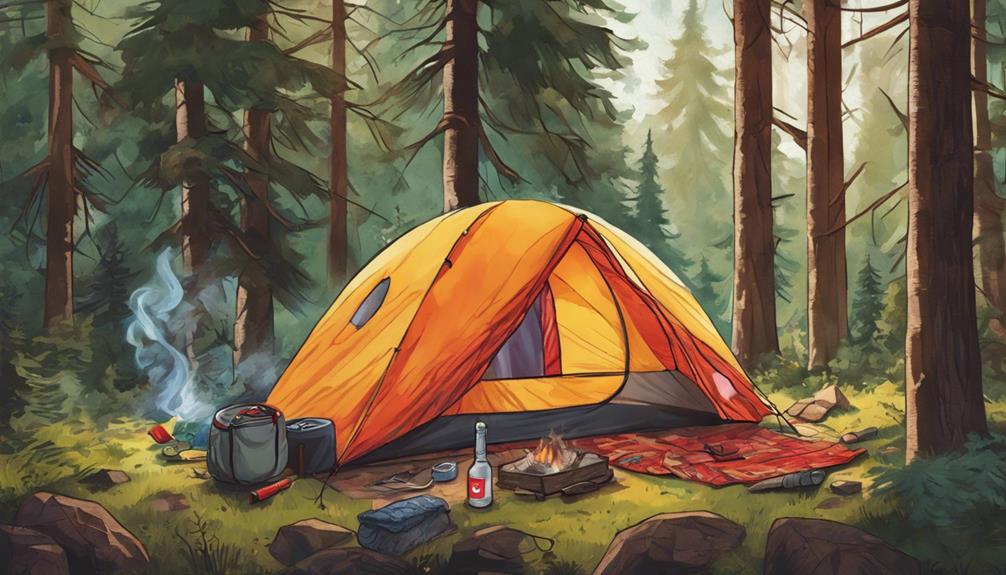
Prioritizing safety is paramount when embarking on solo Tetty camping adventures. When venturing out alone, it's crucial to take precautions to ensure a safe and enjoyable experience. Here are some essential safety tips to keep in mind:
| Safety Precautions | Safety Tips |
|---|---|
| Share your itinerary | Always inform a trusted person of your camping plans, including your route and estimated return time. This provides an extra layer of safety in case of emergencies. |
| Carry emergency supplies | Pack a fully charged phone, a well-stocked first aid kit, and other emergency essentials to handle unexpected situations while car camping. |
| Choose safe locations | Opt for well-traveled and secure camping sites to minimize risks and enhance your safety while camping alone. |
Choosing the Perfect Campsite
To ensure a memorable and safe camping experience, carefully selecting the ideal campsite is key. When camping alone, choosing the perfect campsite becomes even more crucial. Here are some essential factors to consider for a successful solo adventure:
- Terrain and Surroundings: Survey the area for potential hazards and ensure a safe environment for your stay.
- Flat, Level Ground: Opt for a spot with even ground to set up your tent easily and avoid discomfort during the night.
- Access to Water Sources and Facilities: Look for campsites with nearby water sources and bathroom facilities for convenience.
- Distance from Wildlife Habitats: Select a location that's at a safe distance from wildlife habitats to minimize unexpected encounters.
Remember to also factor in the weather conditions when deciding on your campsite. Being aware of potential weather changes and hazards can help you prepare adequately for a comfortable and enjoyable camping experience. Choose wisely, and your solo camping adventure will be off to a fantastic start!
Solo Tetty Cooking Hacks
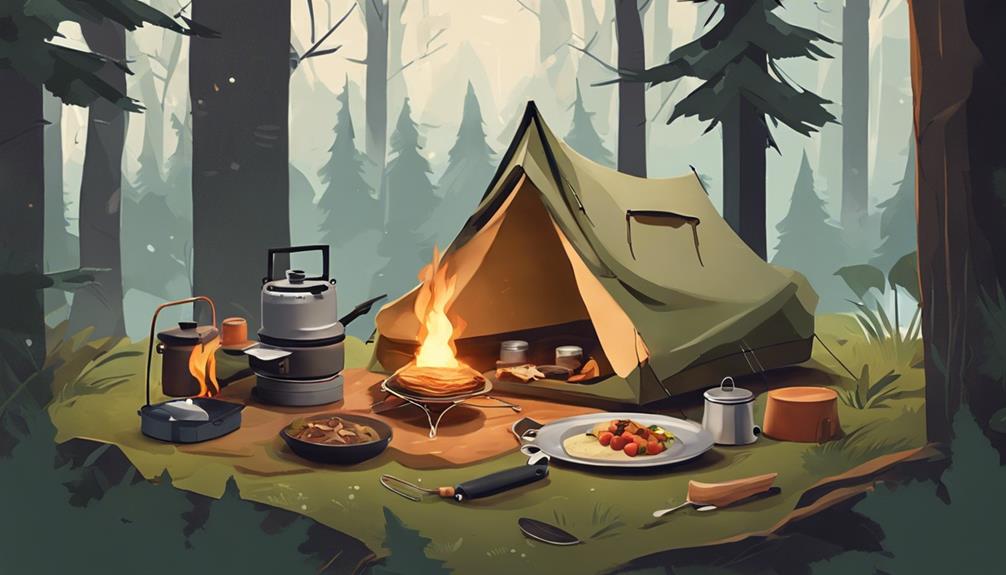
For a delightful culinary experience during your solo Tetty camping adventures, consider incorporating these clever cooking hacks to elevate your outdoor dining game.
When setting up your camping spot, opt for lightweight camping stoves that are easy to transport and efficient for cooking. These stoves are perfect for whipping up quick and delicious meals without weighing you down.
Pack versatile ingredients like canned beans, instant rice, and dehydrated vegetables to create simple yet satisfying dishes.
To add flavor and variety to your campfire meals, bring along a portable spice kit or a selection of seasoning blends.
Investing in a portable grill or specialized cookware set designed for camping can further expand your cooking options, allowing you to cook a wider range of meals with ease.
Embracing Solitude: Mindfulness in Nature

Amidst the tranquil embrace of nature, we find ourselves immersed in the art of mindfulness, a practice that allows us to connect deeply with the present moment. Engaging in mindfulness practices while solo camping can significantly reduce stress and anxiety levels, enhancing the overall experience of solitude in nature.
Here are some ways to embrace mindfulness in the wilderness:
- Take deep, intentional breaths to center yourself and appreciate the fresh air surrounding you.
- Go for calming nature walks to ground yourself in the sights, sounds, and scents of the outdoors.
- Practice gratitude for the natural beauty that envelops you, fostering a sense of contentment and well-being.
- Use the symphony of nature's sounds, from bird songs to rustling leaves, as a form of meditation to quiet the mind and heighten awareness of your surroundings.
Embracing solitude through mindfulness not only enriches your camping adventure but also nurtures self-awareness, creativity, and personal growth in the serenity of the wilderness.
Frequently Asked Questions
Is It OK to Go Camping Alone?
Absolutely, it's okay to go camping alone! We believe solo camping can be a fulfilling adventure with proper preparation.
Assess your comfort level, experience, and safety of the location. By following safety guidelines, sharing plans with others, and being prepared, solo camping offers personal growth and a deeper connection with nature.
It's a rewarding experience that allows for self-discovery and introspection. So go ahead, embrace the solitude and enjoy the journey!
Is Solo Wild Camping Safe?
Absolutely, solo wild camping can be safe if we take precautions. Choosing well-traveled locations, carrying essential gear, and informing someone about our plans are vital steps for safety.
Trusting our instincts and staying aware of our surroundings is key. With proper preparation and caution, solo wild camping can be an enriching and empowering experience.
Is Car Camping Alone Safe?
Car camping alone can be safe if we choose well-traveled spots with cell phone reception. We always inform someone of our plans and pack emergency supplies like a first aid kit. Trusting our instincts and avoiding isolated areas is crucial.
Basic car maintenance skills and a reliable vehicle make the experience safer. By following these steps, car camping alone can be a rewarding and secure adventure.
Where Can I Go Solo Camping?
When considering where to go solo camping, we recommend exploring national and state parks, private campgrounds with secluded sites, wilderness areas, and backcountry options for a more remote experience.
Research online forums and websites for solo-friendly spots and check local regulations and permit requirements.
These locations offer diverse environments and experiences for solo adventurers seeking solitude and nature immersion.
Happy camping!
Conclusion
In conclusion, solo tetty camping offers a unique opportunity to disconnect from the hustle and bustle of everyday life and reconnect with nature.
Did you know that studies have shown spending time in nature can reduce stress levels by up to 50%?
So grab your gear, pick a beautiful campsite, and embrace the solitude and mindfulness that comes with a solo tetty camping adventure.
Happy camping!
Solo Camping
Top 5 Safety Tips for Solo Tent Camping Adventures
Adventure awaits with these top 5 safety tips for solo tent camping – a must-read for a worry-free wilderness experience!
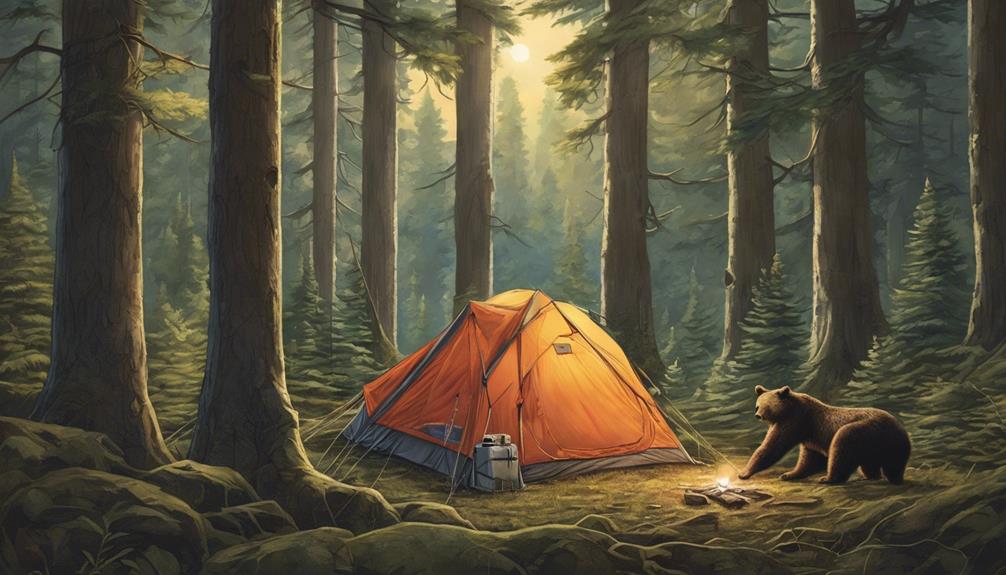
When embarking on solo tent camping trips, it is crucial to prioritize safety. Choose a secure campsite, look for flat terrain far from water, and establish an emergency plan. Carry navigation tools, remain vigilant of your surroundings, and inform a trusted individual of your itinerary.
Remember to handle emergencies, secure food from wildlife, and respect their space. Following these top 5 safety tips will ensure a worry-free wilderness experience.
Key Takeaways
- Choose a secure campsite away from hazards and near help.
- Carry essential tools for navigation like a map and compass.
- Be prepared for emergencies with a locator beacon and first aid skills.
- Stay connected with others and share your itinerary.
- Be cautious of wildlife, secure food, and carry deterrents.
Setting Up a Safe Campsite
When embarking on a solo tent camping adventure, it's crucial to carefully choose and prepare a safe campsite to ensure a comfortable and secure outdoor experience. The first step is to know the area well before setting up camp. Choose a level spot that's clear of hazards like falling branches or rocks that could damage your tent or cause injury. Setting up your tent on flat ground is essential for a good night's sleep, as it prevents discomfort or rolling during the night.
Safety should always come first when camping solo. Keep a safe distance from water sources to avoid unexpected flooding or accidents. Clear the campsite of debris, rocks, and sharp objects to prevent injuries to yourself and damage to your camping gear. Properly secure your tent stakes to ensure stability in windy conditions and prevent your tent from collapsing. By taking these precautions and setting up your campsite with safety in mind, you can enjoy a worry-free solo camping experience.
Navigating the Wilderness
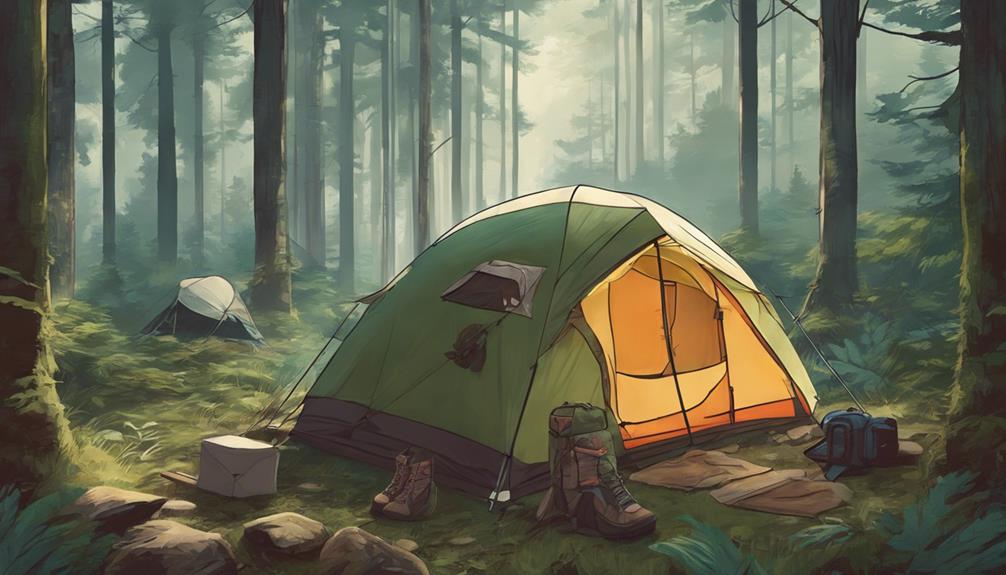
Navigating the wilderness successfully requires carrying essential tools such as a detailed map, compass, and GPS device for accurate orientation. When embarking on a solo camping trip, being well-prepared is crucial for a safe adventure. Alone in the wild, it's vital to learn basic orienteering skills to read maps, identify landmarks, and follow trails effectively. Before setting out, carefully plan your route, considering water sources, emergency exits, and potential hazards along the way. Familiarize yourself with the terrain features and natural landmarks to aid in navigation, enhancing your overall camping experience.
Park rangers often advise campers to stay aware of their surroundings and regularly check their position to prevent getting lost in the wilderness. Additionally, carrying a first aid kit is essential for any outdoor excursion, providing you with necessary supplies in case of emergencies. By mastering the art of navigating the wilderness, you can confidently explore nature while ensuring your safety during your camping trip.
Handling Emergency Situations
In case of emergencies during your solo tent camping adventure, having an emergency GPS locator beacon can be a lifesaving tool for signaling for help in remote areas. This device allows you to call for assistance when faced with unexpected situations or medical emergencies.
Additionally, it's crucial to learn basic first aid skills to address injuries promptly before help arrives. A detailed emergency plan, including contacts and evacuation routes, should always be on hand for quick reference. Stay vigilant of weather changes to prepare for storms or extreme temperatures that could lead to emergencies.
Make sure to pack essential emergency supplies such as food, water, and shelter in your camping gear. Being well-prepared can make a significant difference in handling emergency situations effectively. Remember, staying calm and knowing how to signal for help when in remote areas is vital.
Staying Connected With Others
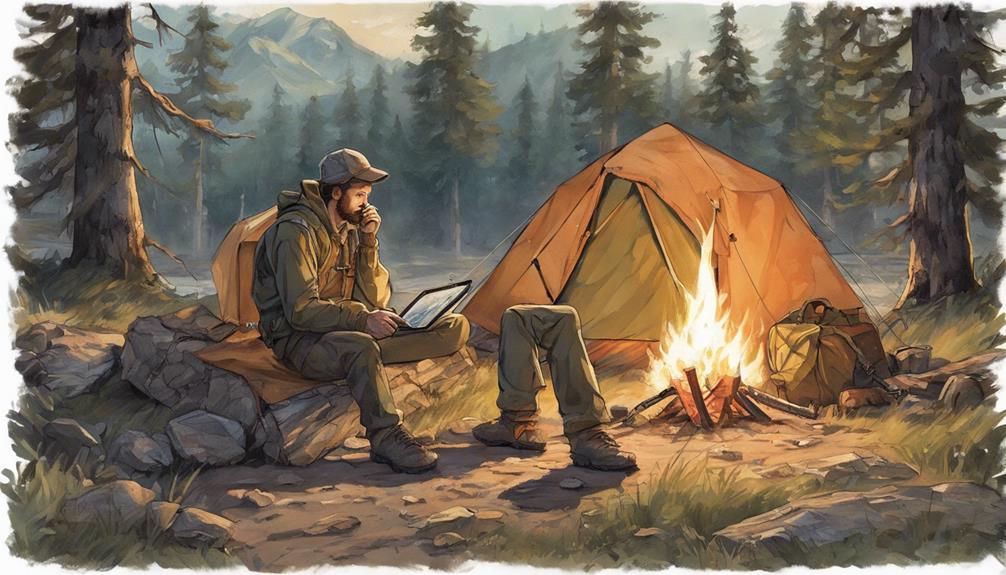
To maintain a sense of security and connection during solo tent camping adventures, it's imperative to establish reliable communication channels with others. When camping alone, sharing your camping itinerary with a trusted individual ensures that someone is aware of your plans and can act promptly if an emergency occurs.
Additionally, utilizing emergency devices such as a personal locator beacon or a satellite phone is crucial to staying connected during your solo trip. These devices can be lifesaving tools in case of unexpected situations.
Choosing campsites with cell service or proximity to civilization enhances your connectivity, providing peace of mind and a way to reach out if needed. In areas with limited cell reception, consider using walkie-talkies or portable radios for communication purposes.
Another helpful tip is to carry a portable power bank to keep your phone charged, ensuring you can stay connected with others throughout your camping adventure. By taking these safety precautions and staying connected, solo campers can enjoy their outdoor experience while being prepared for any unforeseen circumstances.
Being Mindful of Wildlife
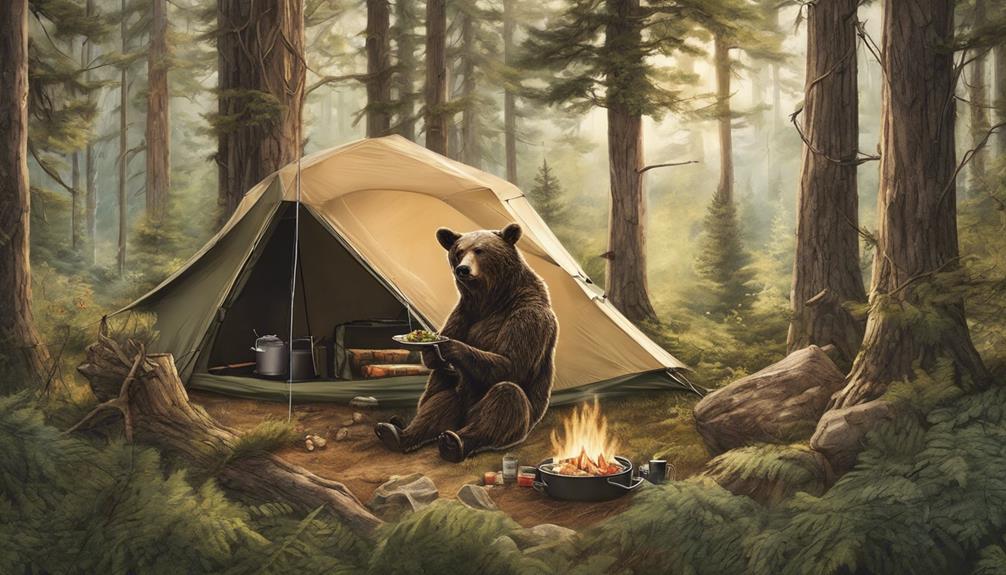
Understanding the local wildlife behaviors and habits in your camping area is essential for anticipating potential encounters during your solo tent camping adventure. Being mindful of wildlife is crucial to ensure a safe and enjoyable experience in nature.
Here are some key tips to help you navigate wildlife encounters effectively:
- Secure food and trash: Properly store your food and dispose of trash to prevent attracting wildlife to your campsite.
- Follow safe interaction guidelines: Familiarize yourself with protocols for wildlife interactions to avoid conflicts or dangerous situations.
- Stay informed about wildlife activity: Keep abreast of any recent wildlife sightings or activity in the area to adjust your camping practices accordingly.
- Carry wildlife deterrents: Equip yourself with bear spray or other deterrents to enhance safety in case of unexpected wildlife encounters.
- Respect wildlife: Remember to observe wildlife from a safe distance and avoid disturbing their natural habitat to minimize potential risks.
Frequently Asked Questions
What Are the Safety Tips for Tent Camping?
When tent camping, safety is key. We always prioritize securing our campsite, keeping it clean, and packing a comprehensive first aid kit.
Understanding emergency contacts and nearby facilities is crucial for a worry-free adventure.
Is It Safe to Tent Camp Alone?
Absolutely, solo tent camping can be safe with the right precautions. By staying aware, prepared, and following safety guidelines, risks can be minimized.
It's crucial to inform others of your plans and carry emergency devices for added security. Opting for well-lit and populated campsites can also enhance safety.
What to Do While Solo Camping?
While solo camping, we enjoy various activities like hiking, stargazing, and bird watching to connect with nature. It's a time to practice mindfulness, meditation, and try new hobbies like outdoor cooking and photography.
Journaling and sketching are great for capturing memories. Taking time for self-reflection and personal growth while immersing in the solitude of camping is essential for enhancing the experience.
How Can a Woman Go Camping Alone?
When we go camping alone as women, it's crucial to prioritize safety. Trust your instincts, avoid sharing your exact location on social media, and inform a trusted person of your plans.
Stay aware of your surroundings and interact with park staff for guidance. Being cautious of suspicious behavior is key. These practices help us enjoy solo camping adventures responsibly and confidently.
Conclusion
In conclusion, solo tent camping can be a thrilling experience, but safety should always be the top priority. By following these top 5 safety tips, you can ensure a successful and enjoyable adventure in the great outdoors.
Remember, it's better to be safe than sorry, so always be prepared for the unexpected.
Happy trails and may your campfire always burn bright!
Solo Camping
Top 5 Stainless Steel Camping Stoves Like Solo Stove
Discover top stainless steel camping stoves like Solo Stove, including the MSR PocketRocket 2 and Jetboil Flash, for unmatched performance and convenience.
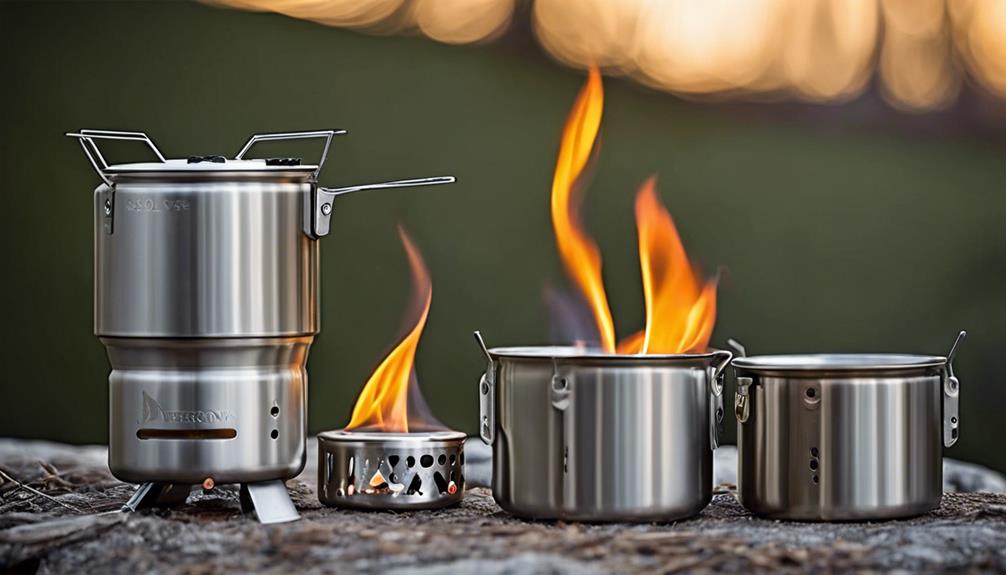
When it comes to top stainless steel camping stoves like Solo Stove, the MSR PocketRocket 2 is our recommendation for its lightweight design and quick water boiling capabilities. The Jetboil Flash Cooking System is another efficient option with fast boil times and portability. For a budget-friendly choice, the Soto Amicus Stove Cookset Combo offers lightweight portability and two included pots. If you’re looking for a premium selection, consider the MSR Reactor 1.7L Stove System for its powerful burner and efficient heat output. Lastly, the Jetboil MiniMo Cooking System stands out with exceptional fuel efficiency and versatile cooking capabilities.
Check out these options for top-notch camping stove alternatives.
Key Takeaways
- MSR PocketRocket 2: Lightweight, efficient, and durable design for outdoor cooking.
- Jetboil Flash Cooking System: Fast boil time, lightweight, and reliable for campers.
- Soto Amicus Stove Cookset Combo: Affordable, lightweight, and includes two pots.
- MSR Reactor 1.7L Stove System: Powerful burner, integrated pot, and efficient heat output.
- Jetboil MiniMo Cooking System: Fuel efficient, versatile, and reliable for outdoor cooking.
MSR PocketRocket 2 ($50)
The MSR PocketRocket 2, priced at around $50, stands out as a lightweight camping stove ideal for backpacking adventures due to its efficient performance and compact design. Using canister fuel, this portable stove weighs only 2.6 oz., making it easy to include in your backpacking gear without adding unnecessary weight.
While it lacks an integrated pot, it compensates with excellent simmer control and a sturdy build that can withstand outdoor conditions. The MSR PocketRocket 2's powerful burner ensures quick water boiling, essential for preparing meals swiftly on the trail. Despite its affordability, this stove doesn't compromise on durability, proving to be a long-lasting investment for outdoor enthusiasts seeking a reliable cooking companion.
Its efficient performance further cements its popularity among backpackers looking for a dependable yet lightweight stove to accompany them on their adventures.
Jetboil Flash Cooking System ($130)
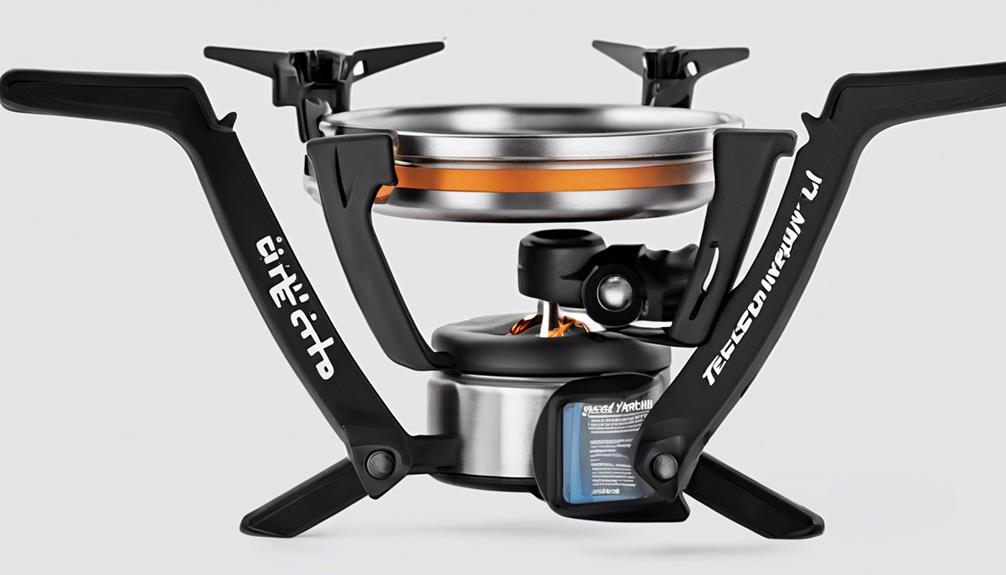
Priced at $130, the Jetboil Flash Cooking System offers outdoor enthusiasts a fast boil time and an efficient integrated pot for quick and convenient cooking during camping or backpacking trips. Weighing just 13.1 oz, this system is remarkably lightweight and portable, making it an excellent choice for outdoor settings.
The Jetboil Flash is designed with speed and performance in mind, ensuring that you can enjoy your meals without unnecessary delays. Its integrated pot allows for efficient cooking, while the fast boil time means you can have hot food or beverages ready in no time.
Whether you're a seasoned camper or new to the outdoor cooking scene, the Jetboil Flash's quick cooking capabilities make it a valuable companion for your adventures. With its focus on lightweight design, portability, and efficient performance, the Jetboil Flash Cooking System is a reliable option for campers looking to streamline their cooking process.
Soto Amicus Stove Cookset Combo ($50)
An affordable backpacker's essential, the Soto Amicus Stove Cookset Combo offers lightweight portability and cooking versatility with its two included pots. Priced at around $50, this stove is a budget-friendly option for backpackers seeking a reliable cooking solution.
Weighing only 11.2 oz. (stove alone: 2.9 oz.), it's easy to carry on outdoor adventures without adding excessive weight to your pack. While the Soto Amicus Stove doesn't come with an integrated pot, the cookset combo compensates by providing two pots for various cooking needs, enhancing the stove's versatility.
Running on canister fuel, this stove ensures convenience and ease of use during camping trips. Ideal for backpackers looking to prepare their camping meals efficiently, the Soto Amicus Stove Cookset Combo serves as a practical starter kit that combines affordability with functionality for a seamless outdoor cooking experience.
MSR Reactor 1.7L Stove System ($290)
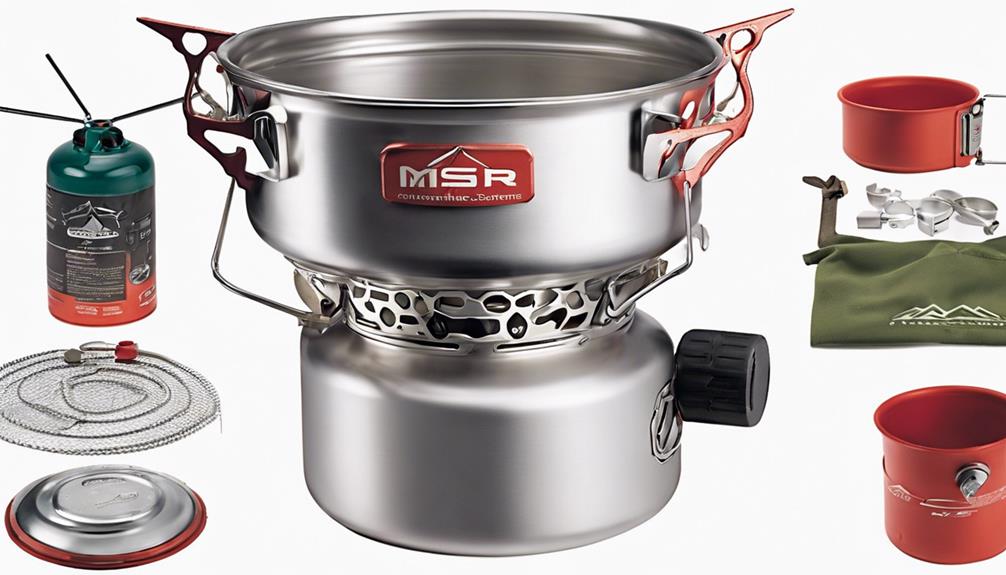
With a price tag of $290, the MSR Reactor 1.7L Stove System stands out as a premium choice for campers seeking top-notch performance in challenging outdoor conditions. This stove system is equipped with a powerful burner that's capable of melting snow and handling cooking tasks efficiently in demanding environments.
The integrated pot adds convenience to the cooking process, allowing for easy meal preparation on the go. Weighing just 1 lb. 2 oz., the MSR Reactor is relatively lightweight considering its impressive capabilities, making it a practical choice for campers looking to minimize their pack weight. Campers appreciate the efficient heat output of the MSR Reactor, which enables quick boil times and enhances overall cooking efficiency during outdoor adventures.
If you're in search of a reliable stove system that can tackle the rigors of challenging conditions, the MSR Reactor 1.7L is a solid investment for mastering your outdoor cooking needs.
- Powerful Burner: Capable of melting snow and handling cooking tasks efficiently.
- Integrated Pot: Adds convenience to the cooking process for easy meal preparation on the go.
- Efficient Heat Output: Enables quick boil times and enhances overall cooking efficiency.
Jetboil MiniMo Cooking System ($170)
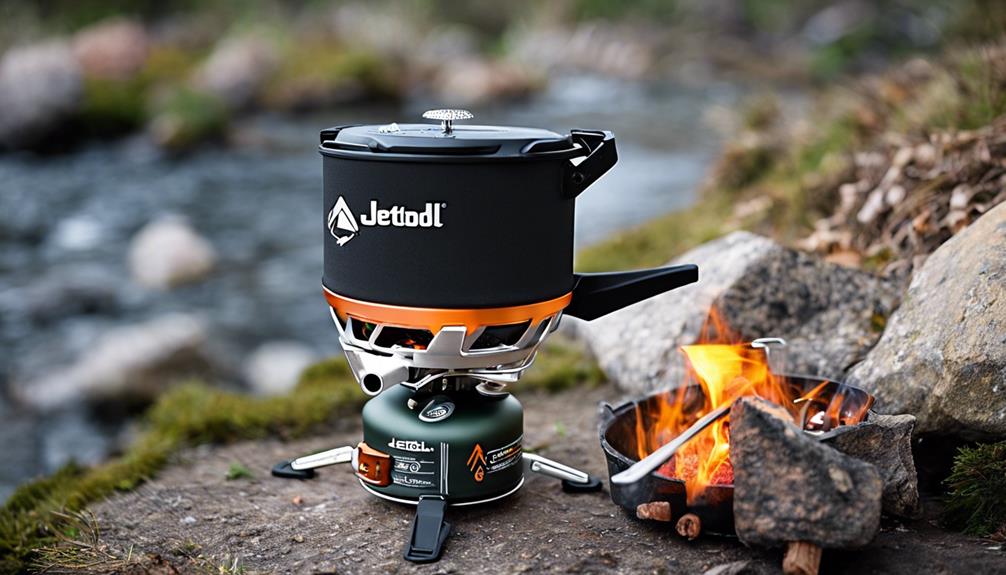
Boasting exceptional fuel efficiency and versatile cooking capabilities, the Jetboil MiniMo Cooking System at $170 is a top contender for campers seeking a reliable and efficient stove solution.
This stainless steel camping stove is designed with integrated pot support and simmer control, allowing for a wide range of cooking options in outdoor settings. The Jetboil MiniMo's stable design ensures safety during use, and its efficient boil time of 8.0 makes it a practical choice for quick meal preparation.
Priced competitively, it offers excellent value for its features, making it a popular choice among camping enthusiasts. The MiniMo's lightweight construction adds to its appeal, making it easy to transport and set up at campsites.
With its reputation for durability and performance, this cooking system is a versatile companion for outdoor adventures, providing campers with a reliable tool for all their cooking needs.
Frequently Asked Questions
Does Solo Stove Have a Competitor?
Yes, Solo Stove does have competitors in the market. Brands like BioLite, Winnerwell, Ohuhu, and Unigear offer similar stainless steel camping stoves.
These competitors provide features like electricity generation, adjustable vents, and compact designs. They come in different price ranges, sizes, and materials to cater to various camping needs.
Each competitor brings unique advantages, such as eco-conscious cooking, affordability, and space efficiency.
What Is the Best Single Stove Burner for Camping?
We believe the best single stove burner for camping is the Solo Stove Lite.
Made of premium stainless steel, it offers durability and heat resistance. Its unique double-wall design creates efficient combustion.
Lightweight and compact, it's perfect for backpacking.
With a minimalist and eco-friendly approach, the Solo Stove Lite is a top choice for outdoor enthusiasts seeking reliable cooking solutions.
What Is the Difference Between a Solo Stove and a Flame Genie?
When comparing a Solo Stove to a Flame Genie, the former focuses on efficient burning through a double-wall design for nearly smokeless fires, ideal for campers.
In contrast, the Flame Genie, a wood pellet fire pit, uses a pellet hopper system for consistent heat output, catering to those seeking controlled fires.
Both emphasize heat efficiency and reduced smoke, making them popular for outdoor enthusiasts.
Which Stove Is Best for Camping?
We believe the best camping stove should balance efficiency, durability, and portability. Factors like fuel type, cooking capacity, and ease of use are also crucial.
Consider stoves like the Solo Stove Lite for its efficient, smokeless design, or the Winnerwell Woodlander Stove for its traditional box-style and flat cooking surface.
Each camper's needs differ, so evaluate features that align with your camping style for the best choice.
Conclusion
After researching and comparing various stainless steel camping stoves like the Solo Stove, we've found some great alternatives that offer similar quality and functionality.
For example, one camper reported using the MSR Reactor 1.7L Stove System on a week-long hiking trip and was impressed by its efficiency and durability.
Whether you're a weekend warrior or a seasoned outdoor enthusiast, investing in a reliable camping stove is essential for enjoying delicious meals on the go.
-

 Beginners Guides1 month ago
Beginners Guides1 month agoLaienhaft Acquires aircooled-tv.com Domain to Add Focus on Aircooled Campervans
-

 Backpacker1 month ago
Backpacker1 month agoLaienhaft Acquires Infos-Campings.Com Domain – Our Joined Way Forward to Experience Outdoor, Camping, and Making Friends and Live the Experience
-
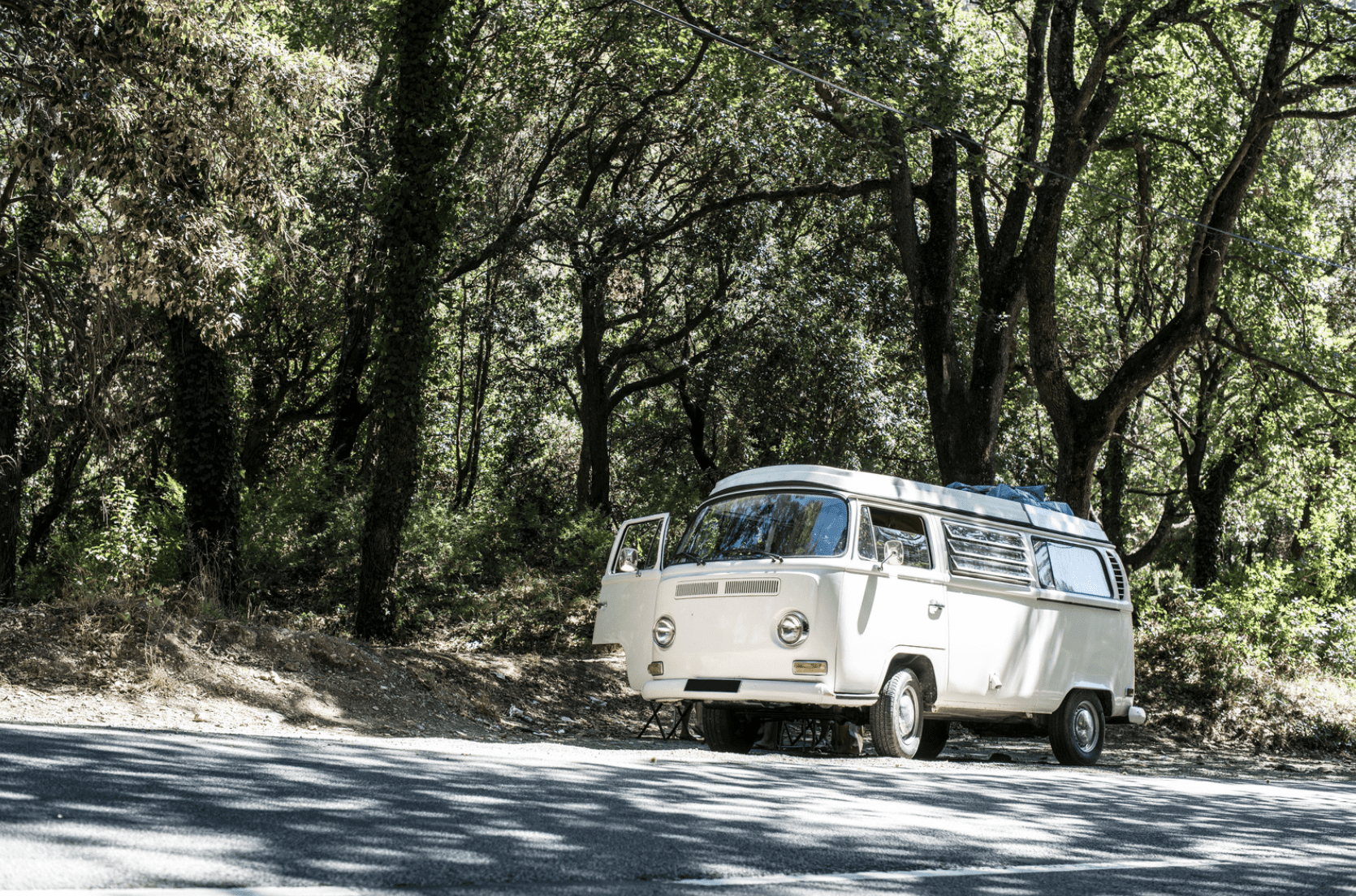
 Beginners Guides1 month ago
Beginners Guides1 month agoThe Guide to the Best Camping License Plate Ideas for Cars and RVs
-
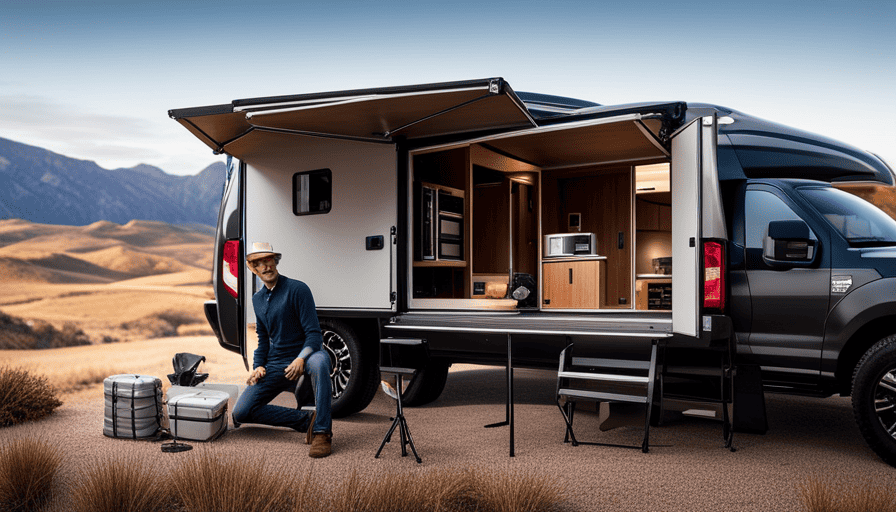
 Beginners Guides2 months ago
Beginners Guides2 months agoHow To Build A Slide In Truck Camper
-
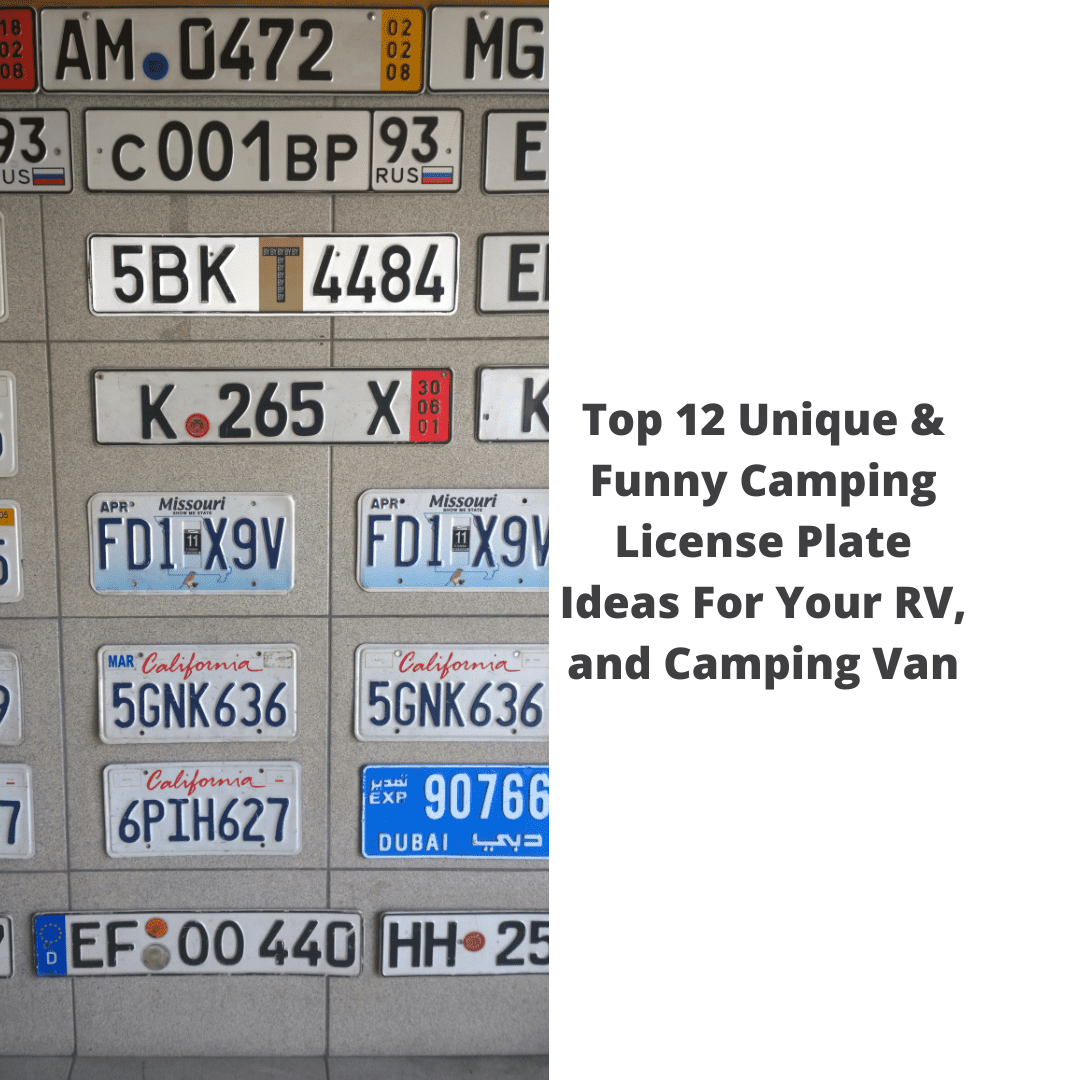
 License Plate1 month ago
License Plate1 month agoTop 12 Unique & Funny Camping License Plate Ideas For Your RV, and Camping Van
-

 Beginners Guides1 week ago
Beginners Guides1 week agoHow To Install A Camper Shell
-

 Beginners Guides2 weeks ago
Beginners Guides2 weeks agoHow To Lubricate Pop Up Camper Lift System
-

 Beginners Guides1 month ago
Beginners Guides1 month agoWhy Does My Throat Hurt After Camping? The Most Common Reasons and How to Fix Them


